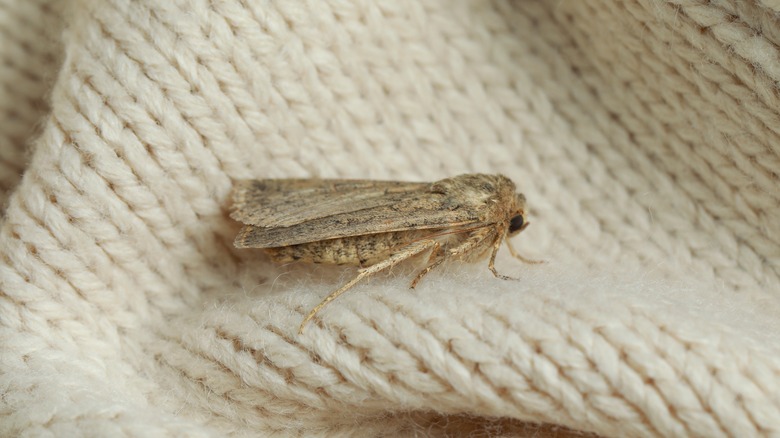Keep Moths Out Of Your Home With Just A Handful Of Common Herbs
Moths may seem innocent and unobtrusive, but it's their offspring that pose the real problem. The larvae of these winged creatures are the culprits behind extensive damage to your clothing, carpets, and other fabric items around your home. Faced with this menace, you might feel compelled to reach for chemical repellents or mothballs. However, if you're someone who cherishes a more natural approach, there is a practical, herb-based alternative waiting for you.
Certain herbs, known for their distinctive and potent aromas, are more than just culinary stars; they double up as effective moth deterrents. Moths have a keen sense of smell and are particularly sensitive to strong, aromatic scents. A unique blend of household herbs, including mint, dried rosemary, thyme, cloves, lavender, and bay leaves, acts as a formidable olfactory barrier to these pests. These herbs, when dried, release fragrances that we humans find comforting and refreshing, but that are highly disagreeable to moths.
However, this method isn't just a makeshift, last-ditch effort against an infestation. It represents the remarkable power of nature to offer practical solutions to everyday problems. By opting for these herbal defenses, you're not just safeguarding your precious textiles and garments, but you're also fostering a healthier, chemical-free environment within your home — a place where synthetic repellents have no room. With this in mind, we'll now delve deeper into the nitty-gritty of preparing an herbal moth repellent for maximum effect.
How to prepare an herbal moth repellent
As we've already discussed, certain herbs, including lavender, rosemary, mint, thyme, cloves, and bay leaves, carry distinct, potent scents that these winged nuisances find deeply off-putting. To prepare your herbal repellent, start by drying out your chosen plant. You can do this by placing their leaves in a spot with good air circulation. Once they're entirely devoid of moisture, they're ready for their task. You then have a couple of options. One is to stuff the dried herbs into small sachet bags — preferably made of a porous material like cotton that permeates the scent. These sachets can then be hung in your closets, stashed among your garments, or placed in other areas vulnerable to moth infestation.
As the herbs sit in these spaces, they slowly release their aromatic oils. The scent wafts through your home, creating a pleasant, refreshing ambiance for you while simultaneously establishing a no-go zone for moths. However, it's crucial to remember that herbs aren't a one-and-done solution. Just like any other natural material, herbs slowly lose their potency over time. The aromatic oils that provide their distinct smells gradually dissipate, decreasing their effectiveness as moth repellents. To ensure your home remains protected, you should replace the sachets or replenish the loose herbs every few months.
Enhancing your herbal moth repellents
While the herbs mentioned above hold their own ground, you can significantly amplify their effect against moths with essential oils. Essential oils, with their concentrated scents, are well-known moth deterrents. The combination of these powerful oils with the already aromatic herbs creates an extraordinarily effective moth repellent. To concoct this synergistic blend, simply add a few drops of your chosen essential oil (preferably something woody like sandalwood or cedarwood) to the dried herbs before placing them in sachets or spreading them over vulnerable areas. The oil intensifies the herbs' aroma, magnifying their moth-repelling ability and transforming your home into a place where moths fear to tread.
However, to ensure the utmost protection against these pests, adopting good housekeeping practices is non-negotiable. Regular vacuuming, especially in the nooks, crannies, and under furniture, helps eliminate potential moth eggs and larvae before they can wreak havoc. Regularly cleaning your clothes, particularly before storing them, and avoiding damp, dark conditions, can dissuade moths from making your home their breeding ground. The bottom line is, with a few common herbs, you can protect your home from moths without resorting to harsh chemicals. It's a cost-effective, eco-friendly solution that's well worth trying. So, the next time you see a moth flutter by, you know exactly what to do.


